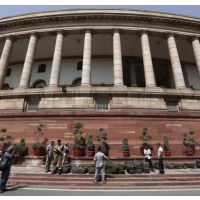Reform 07: Govt Bypasses Rajya Sabha for Insurance Reform via Ordinance
 Opposition parties, which control the Rajya Sabha, had stalled the bill’s passage (file photo: Reuters)
Opposition parties, which control the Rajya Sabha, had stalled the bill’s passage (file photo: Reuters)
With opposition parties stalling the Rajya Sabha in the session that ended on Tuesday, the government has gone ahead with its reform of the insurance industry using the ordinance route instead. Prime Minister Narendra Modi’s cabinet has approved a measure to raise the cap on foreign direct investment (FDI) in insurance from 26 per cent to 49 per cent.
The ordinance must still be approved and issued by President Pranab Mukherjee before it becomes law, though that is expected to be a formality. Finance Minister Arun Jaitley told journalists on Wednesday that the language used in the ordinance had been approved by a select committee representing an “overwhelming majority” in both houses of parliament.
He said pushing ahead with the long-awaited reform despite parliamentary obstruction was an affirmation of the Modi government’s determination to pursue economic reforms to help revive a sluggish economy.
“The ordinance demonstrates the firm commitment and determination of this government to reforms,” Jaitley said. “It also announces to the rest of the world, including investors, that this country can no longer wait, even if one of the houses of parliament waits indefinitely to take up its agenda.”
According to the Financial Times, the government wanted to announce the liberalisation of investment in insurance ahead of US President Barack Obama’s visit to India next month as the chief guest for Republic Day.
Under the ordinance, foreign firms can increase their participation in insurance joint ventures to 49 percent, a potential lifeline for a sector starved of capital and squeezed by regulations.
Shares of companies with insurance businesses such Max India and Reliance Capital rallied on the news.
Shashwat Sharma, a partner at consultant KPMG, said the reform would attract up to $4 billion of new investments into the inusrance sector.
"It will bring in a lot of confidence and people waiting for it would start thinking through it," he told Reuters.
However, the ordinance may not to lead to an immediate wave of new foreign investment, as an ordinance needs to be approved by parliament within six months, or it must be reissued.
The finance minister said he hoped the ordinance would be approved by parliament once it reconvenes in February. Officials said moves undertaken under the ordinance would remain valid even after its expiry.
Opposition parties, which control the upper house of parliament, had stalled the bill’s passage because of an unrelated controversy over religious conversions.
“If parliament is not allowed to function, the framers of the constitution have provided for a means to see that the running of the country doesn’t come to a halt,” Jaitley said. “Stalemate and obstructionism can’t go on in perpetuity.”
Even though the insurance measure enjoys rare bipartisan support, there is a risk that it could meet the fate of the ordinance that Modi had issued earlier to open up the coal industry to the private sector.
The ordinance called for fresh auctions of coal blocks after previous allocations were scrapped by the Supreme Court, due to lack of transparency in the process.
A bill to convert that ordinance into a law failed to make headway in the last parliament session, forcing the cabinet to renew it on Wednesday.
Auctions will now be held for coal blocks to use in the power, steel and aluminium sectors, which the cabinet wants completed by March 31.
- Karan Singh
To Learn More:
Modi orders insurance, coal reforms after stymied by parliament (by Nigam Prusty and Rajesh Kumar Singh, Reuters)
Modi bypasses upper house to push through India insurance reform (by Amy Kazmin, The Financial Times)
Govt fastracks reforms in coal, insurance sectors (Hindustan Times)
Conversion Issue Hijacks Parliament Agenda (by Karan Singh, AllGov India)
Supreme Court Declares 1993-2010 Coal Allocations ‘Illegal’ (by Karan Singh, AllGov India)
- Top Stories
- Controversies
- Where is the Money Going?
- India and the World
- Appointments and Resignations
- Unusual News
- Latest News
- India College Chain’s Expansion into U.S. Draws Opposition from Massachusetts Officials over Quality of Education
- Milk Shortages in India Tied to Release of New Movies Featuring Nation’s Favorite Stars
- Confusion Swirls around Kashmir Newspaper Ban in Wake of Violent Street Protests
- Polio-Free for 5 Years, India Launches Vaccine Drive after Polio Strain Discovery
- New Aviation Policy Could Increase Service, Lower Ticket Prices






Comments